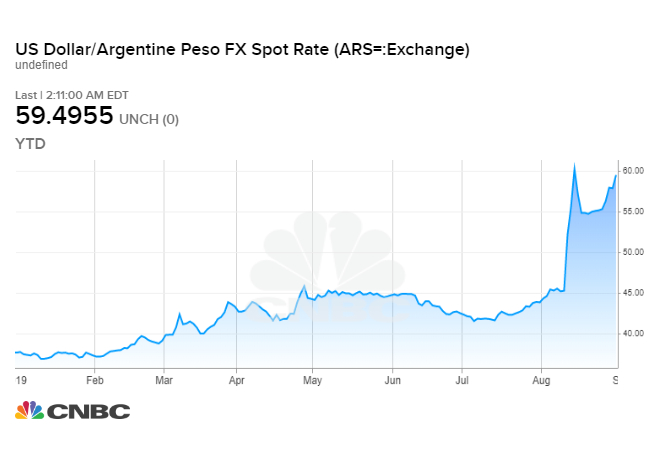A woman walks with an Argentinian flag during a march in support of President Mauricio Macri on August 24, 2019 in Buenos Aires, Argentina.
Ricardo Ceppi | Getty Images News | Getty Images
Argentina's government has imposed currency controls in a bid to stabilize financial markets, as Latin America's third-largest economy faces a deepening economic crisis.
The temporary measures, announced on Sunday, allow the government to restrict foreign currency purchases following a sharp drop in the super-sensitive peso.
All companies must now request permission from Argentina's central bank to sell pesos and buy foreign currency to make transfers abroad.
In an official bulletin issued on Sunday, the government said currency controls were necessary "to ensure the normal functioning of the economy."
The latest move follows the surprise announcement on Wednesday that Argentina would seek to defer payments on roughly $100 billion of debt, which credit rating agency S&P classified as a default under its own criteria.
The measures — which will remain in place until the end of the year — constitute a startling turnabout for President Mauricio Macri.
Shortly after starting his term in December 2015, the embattled leader of South America's second-largest country abruptly removed strict capital controls that had been in place since 2011.
Macri's government and the central bank are trying to shore up confidence in financial markets ahead of the presidential election on October 27.
IMF doesn't want to be the one that 'pulled the plug'
Recession-hit Argentina has been struggling with a financial crisis, which was exacerbated by the president's stunning defeat in a recent primary poll.
In a vote seen by many as a key gauge for the first round of Argentina's presidential election at the end of October, business-friendly Macri lost by a far greater margin than expected to the opposition ticket of center-left Alberto Fernandez and populist ex-leader Cristina Fernandez de Kirchner.
The peso fell to a record low last month, after the primary result cast serious doubt over the center-right incumbent's re-election chances.
Argentina's currency, seen by some as a guide for the country's economy, closed at around 59.49 per U.S. dollar on Friday. The peso has fallen more than 30% since the August 11 primary vote.

Market participants had expected some form of capital controls from Argentina's government. However, some are concerned the move could jeopardize the International Monetary Fund's (IMF) latest disbursement of its historic $57 billion bailout program.
James Athey, senior investment manager at Aberdeen Standard Investments, told CNBC's "Squawk Box Europe" that he still believes the IMF will deliver another $5.4 billion tranche to Argentina later this month.
"Essentially, the IMF doesn't want to be the one that pulled the plug."
Athey argued credit rating agencies had the same problem when it comes to Argentina, with many of them "rushing" to downgrade the country to junk status in recent weeks.
"Realistically, the underlying health of the situation, I don't think it has changed that dramatically. What has happened is that prices of some of the external assets have changed and given the facade that things are dramatically worse… They were always pretty bad."
"So, I don't think the IMF wants to be the one that says: 'No, you can't have that last bit of money'. But, $5 billion at this stage is really throwing a few pennies into the wishing well," Athey said.
https://www.cnbc.com/2019/09/02/argentina-macri-imposes-currency-controls-as-debt-crisis-deepens.html
2019-09-02 08:10:06Z
52780370600778
Tidak ada komentar:
Posting Komentar